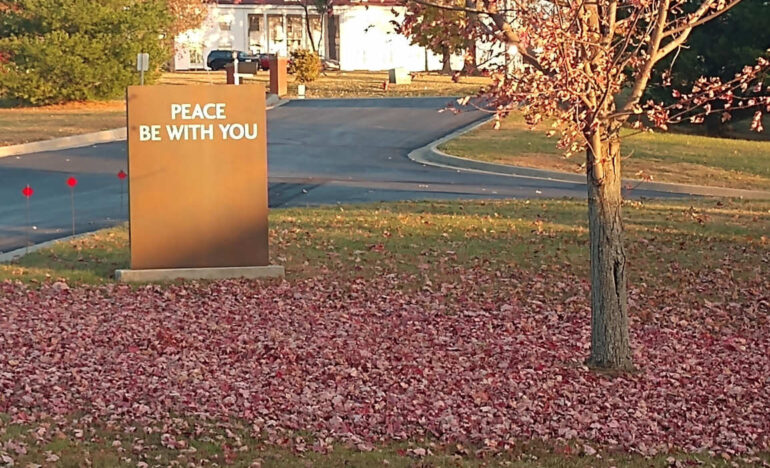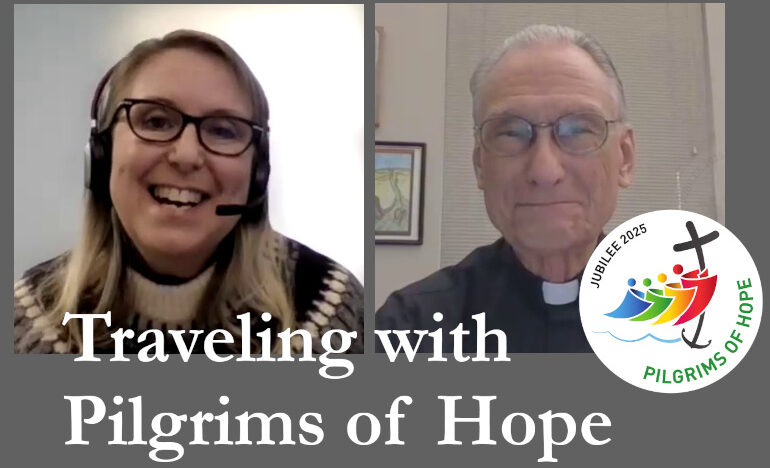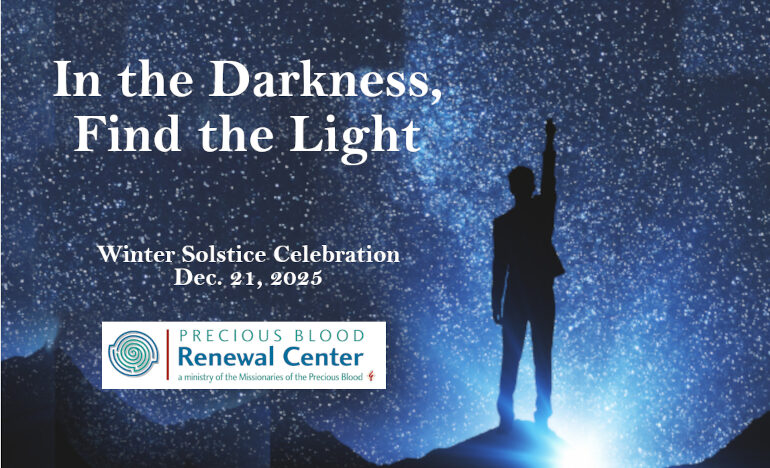Some things you should know about suicide

By Fr. Garry Richmeier, CPPS
I have been a counselor and marriage and family therapist for 20 some years. Today, I’d like to speak a little bit with you about suicide. Nobody really wants to talk about suicide. It’s a scary subject. People don’t understand it. It’s kind of a taboo subject in our culture. And so people tend to ignore it or not talk about it.
But you can’t solve a problem without talking about it. If it’s your problem, you can’t find help if you don’t talk about it. That is why I think it’s a good thing to be informed about suicide and to be able to talk with each other about it. That way we can help each other as a community.
National Suicide Prevention Lifeline at 1-800-273-TALK (8255)
The Crisis Text Line (text HELLO to 741741)
The hearing impaired can contact the Lifeline via TTY at 1-800-799-4889.
- 1-800-273-8255 and Press 1 to talk to someone
- or send a text message to 838255 to connect with a VA responder.
- You can also start a confidential online chat session at veteranscrisisline.net/get-help/chat.
Dial 911 in an emergency.
The first thing I want to say about suicide is that what will help — and will help a lot of the ills in our society — is that we need to stay connected with each other. We need to be community for each other, to be a compassionate support to each other. If there’s one thing I want to say about suicide, that would be it.
Some statistics
Suicide is the 10th leading cause of death in our society. In 2018, there were 48,000 suicides. That’s two and a half times the number of homicides. That’s probably a low number because many causes of death are labeled accidental, which are actually suicide. So that number is probably low. Males commit suicide four times higher than females.
The group that’s most at risk is middle-aged and elderly men. Experts say that they are at risk because much of their identity is tied up in their work and producing. And when they retire, there is nothing that gives meaning to their life. That’s very depressing and suicide is often the result.
Rural areas have higher rates of suicides than urban areas. Firearms are the number-one way people commit suicide, followed by suffocation and poison. The age group that thinks about suicide the most is 18 to 25 year olds. That’s very dangerous, because people of that age tend to be more impulsive. If they’re thinking about it more, they may actually do it.
Who’s at risk?
If you’re wondering if someone may be thinking about suicide the first thing to do is ask about it, to talk about it. Ask them, “How are you feeling? You seem down.” If they are talking about being depressed, being sad, ask them if they are thinking of suicide.
People don’t want to ask that question, because they think that will put the idea in their head. Experts say that’s not the case. It’s not talking about it that can make it worse. So asking someone if they’re thinking about suicide is OK. That will allow them to get out whatever they need to get out. They will know that you’re available to help them.
What are some signs and symptoms?
If someone is talking about any of the things listed below, these could be indications that they might be thinking about suicide. They might talk about:
- Wanting to die.
- Feelings of hopelessness or having no reason to live.
- Feelings of a great guilt and shame.
- Feeling trapped, that there are no solutions to their problems.
- Unbearable pain.
- That they are a burden to others.
Following are behaviors that you can observe and can ask the person of concern about:
- Increased or more frequent use of alcohol or drugs.
- They seem anxious, agitated, or are withdrawing from family and friends.
- They start giving away important possessions.
- Saying goodbye to family and friends, and maybe in veiled forms.
- Putting their affairs in order, making a will.
These behaviors could be indications of suicidal thoughts. If you know someone who is doing some of those things, and you’re wondering, then by all means talk to them; ask them, “Are you thinking about it?”
Certain life circumstances can put people at risk of suicide. Some of these risk factors are:
- Someone who has a substance abuse disorder. They are more likely to try suicide.
- Chronic pain.
- A prior suicide attempt.
- A family history of mental disorder or a family history of suicide.
- Family violence, including physical or sexual abuse.
- Having guns and firearms in the home.
- Someone who has been recently released from prison or jail.
- Being exposed to others’ suicidal behavior.
Those are some risk factors of which to be aware.
What can you do?
One thing you can do is keep them safe. This means reducing their access to lethal means. Take guns out of the house if possible. If they have pills, monitor those.
Be there for them. Listen to them. Find out what they’re thinking, feeling. Show your compassionate support by being there and talking about those thoughts.
When you’re talking to them ask, “Are you just thinking about suicide or is this specific?” Ask them if they have a plan. If they have made a plan of how to do it — when, where, how — the more detailed a plan is probably the closer they are to committing suicide.
If they say, “Well, I just thought about it.” It’s kind of vague. OK, that’s less serious. It is serious, but it’s less serious than having a plan. If you know that someone has a plan, they have a date, they were saying, “Yeah, I’m going to do it,” then call 911. Their protection is the main thing.
Stay connected to them.
Even after the crisis is over, stay connected with them. It is that connection with each other that is important. Be there and give them information of how to help, how they can find help other than you.
On this page are hotline numbers to call or text and websites where you can get information. You can give someone you’re concerned about those resources. There is a lot of information and resources available.
I think we need to get away from old ways of thinking about suicide. It used to be that suicide was looked at like homicide. It was a crime. It was a sin. We have to get away from those ideas. Homicide is built on hate. You hate someone. That’s why people kill each other.
The main reason for suicide is not to kill yourself. I know that sounds strange. People commit suicide, usually, to get away from the pain, to end the pain, whatever the pain is. There is physical pain. If someone is in physical pain for a long time, it takes a toll and they just want to end it. Sometimes it’s emotional pain, maybe a loss or divorce or whatever it is. Emotional pain can be as painful as physical pain and people will commit suicide to get away from emotional pain.
Sometimes it’s a combination of revenge and ending the pain. Like murder-suicides — a person murders their spouse for divorcing them, then they kill themselves. It’s still ending their pain, but it’s also tied up in revenge.
Are you thinking of suicide?
So we’ve talked about some of the things you can do to help others, but what if you yourself are thinking of suicide. What can you do? Reach out. Reach out to those people who love you. That can be hard to do, but you can do it.
People turn to suicide because they see no other option. So if we can present someone another option for ending the pain, as in our relationship with them or our support or resources out there and counseling, then there’s another option and they don’t have to choose suicide.
That is important to do, to present other options.
There’s lots of information out there on the web about suicide, what it is, which people have attempted suicide or think about it, why they attempted it. That’s good information to have, but again, the main thing is — as I began with — to be with each other, to connect, to support, to be compassionate, to be the body of Christ.
That is the most basic thing. That’s the most powerful force in the universe, and it can go a long way to reducing suicide as well as many of the other ills in our society.
I hope this has been helpful. I hope that if you are depressed, if you have thought about suicide, please reach out. Give me a call. Give someone a call. Reach out to those people who love you. Thank you, and God bless.
[Fr. Garry Richmeier, a Precious Blood priest and spiritual director, holds a Master’s of Divinity Degree from St. John’s University in Collegeville, Minnesota, and a Master’s of Counseling Psychology degree from the University of Missouri-Kansas City. He is a licensed professional counselor and a licensed marriage and family therapist.]
Related

Pilgrims of Hope, Episode 11 Walking with Young People
In this episode of the Jubilee Year video series, “Traveling with Pilgrims of Hope,” we talk with Teri Iverson, the Vocation Ministry Coordinator for the Sisters of the Precious Blood in Dayton, Ohio, about the joy and hope she finds in working among young people.

Video: Winter Solstice Celebration 2025
The Winter Solstice is the longest night of the year and the earth lies fallow. We are drawn naturally into contemplation. At the Renewal Center, we mark the Winter Solstice with a time of slow, quiet reflection and fellowship.
Categories
Assembling God's Puzzle Coffee with Padre Cooking & Spirituality Encounters of the 4th Kind Family Matters Guided Meditations Reflections on the Eucharsitic Prayers Spiritual Resources Taize Prayers Teach Us to Pray The Contemplative Life Traveling with Pilgrims of Hope Uncategorized Videos When you need a little help
